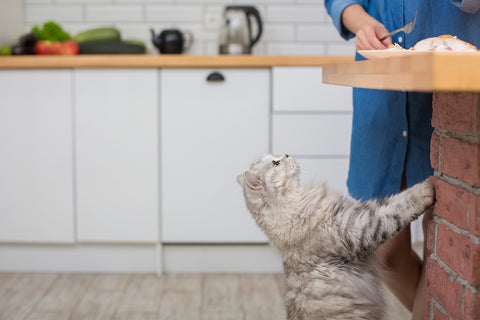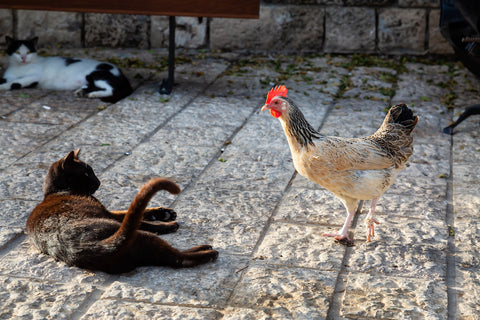Can Cats Eat Chicken Bones? Here's What You Need to Know
If you're a cat owner and have ever enjoyed a delicious plate of chicken, you might have wondered if it's safe to share a small piece of chicken bone with your feline friend. After all, cats are carnivores, and chicken is a popular meat choice for many pet owners. However, the question of whether cats can eat chicken bones is a bit more complicated than it seems.
Chicken Bones and Cats: A Dangerous Combination

Are Chicken Bones Safe for Cats?
The short answer is no; it's generally not safe to feed your cat chicken bones. Chicken bones, especially those that are small and brittle, can pose several risks to your cat's health. Here are some of the key reasons why you should avoid giving chicken bones to your feline companion:
Choking Hazard: Small chicken bones can splinter easily, creating sharp fragments that can pose a choking hazard for your cat. Cats may not chew bones thoroughly, and swallowing a sharp fragment could lead to serious injuries.
Gastrointestinal Obstruction: Ingesting chicken bones can also lead to gastrointestinal obstructions. Sharp bone fragments can get lodged in the throat, stomach, or intestines, causing pain and discomfort for your cat and potentially requiring surgical intervention.
Dental Issues: Gnawing on bones may seem like a natural activity for cats, but it can damage their teeth. The hard and brittle nature of chicken bones can cause dental fractures or breakages.
Bacterial Contamination: Chicken bones can carry harmful bacteria like Salmonella or Campylobacter. These bacteria can make your cat sick, leading to symptoms such as vomiting, diarrhea, and lethargy.
Nutritional Imbalance: While cats are obligate carnivores and need a diet rich in meat, chicken bones do not provide the necessary nutrients and can disrupt their balanced diet.
Why Cooked Chicken Bones are Especially Dangerous?
Cooked chicken bones are especially dangerous for cats.
Cooking chicken bones causes them to become brittle. This brittleness makes them more likely to splinter and break into sharp pieces when chewed or swallowed. These sharp fragments can cause serious internal injuries.
Cooked chicken bones are more difficult to digest than raw bones. The cooking process changes the structure of the bones, making them harder and more likely to remain intact as they pass through the digestive tract. This can increase the risk of blockages.
While it may be tempting to share your chicken bones with your cat, it's best to err on the side of caution and avoid this practice.
So, What Should You Do?
Instead, prioritize their health and happiness by offering safe alternatives that can still provide a tasty and satisfying treat.
Safer Alternatives to Chicken Bones for Cats
Absolutely, there are many safer alternatives to chicken bones that you can offer to your cat to satisfy their natural instincts and provide them with enjoyable treats.
Here are some options:
Commercial Cat Treats: High-quality commercial cat treats are specifically formulated for feline dietary needs. Look for treats that are low in fat, contain no harmful additives, and are designed to promote dental health or provide specific nutritional benefits.
Catnip: Many cats love catnip, which is a safe and natural herb that can stimulate their senses. You can offer catnip in various forms, such as dried catnip leaves, catnip-infused toys, or even catnip sprays.
Freeze-Dried Meat Treats: Freeze-dried meat treats, such as freeze-dried chicken, beef, or fish, can be a great option. They are high in protein and are usually free from artificial additives.
Commercial Dental Chews: Dental chews designed for cats not only provide a tasty treat but also help with dental hygiene by reducing plaque and tartar buildup. These can be a great way to keep your cat's teeth healthy.
Interactive Toys: Invest in interactive toys that dispense small amounts of kibble or treats as your cat plays with them. This not only satisfies their hunting instincts but also encourages physical activity and mental stimulation.
Canned Cat Food: Some cats enjoy canned cat food as a special treat. You can provide a small amount of canned food as an occasional treat, making sure it's a good fit for your cat's dietary requirements.
Homemade Cat Treats: You can make homemade cat treats using cat-safe ingredients. Here's a simple recipe for homemade cat treats:
Homemade Tuna Cat Treats:
Ingredients:
1 can of tuna in water, drained
1 cup whole wheat flour
1 egg
1 tablespoon dried catnip (optional)
Preheat your oven to 350°F (175°C) and line a baking sheet with parchment paper.
In a food processor, combine the drained tuna, whole wheat flour, egg, and catnip (if using). Blend until the mixture forms a dough.
Roll out the dough to about 1/4-inch thickness and use a cookie cutter or knife to cut out small treat-sized pieces.
Place the treats on the prepared baking sheet and bake for about 10-12 minutes or until they're slightly browned and crispy.
Allow the treats to cool completely before offering them to your cat.
Always remember to provide treats in moderation, as they should complement your cat's regular balanced diet, not replace it.

First Aid for Cats Who Have Eaten Chicken Bones?
If you suspect that your cat has ingested chicken bones, it's crucial to take immediate action to ensure their safety.
While providing first aid at home is limited in such situations, here's what you can do:
Stay Calm: Keep calm and try to assess the situation. It's essential not to panic.
Contact a Veterinarian: Call your veterinarian or an emergency veterinary clinic immediately to seek professional advice and inform them of the situation. They can provide guidance specific to your cat's condition.
Observe Your Cat: Keep a close eye on your cat's behavior. Look for signs of distress, such as gagging, retching, coughing, difficulty breathing, vomiting, diarrhea, lethargy, or drooling.
Do Not Induce Vomiting: Do not attempt to induce vomiting in your cat without professional guidance. In some cases, attempting to induce vomiting can make the situation worse.
Keep the Cat Calm: Try to keep your cat as calm as possible. Stress can exacerbate the situation, so provide a quiet and comfortable space for them.
Do Not Feed: Do not feed your cat any more food, treats, or water until you receive instructions from your veterinarian. Feeding may push the bone further down the digestive tract, increasing the risk of injury.
Follow Veterinary Advice: Follow the guidance provided by your veterinarian, which may include bringing your cat to the clinic for a physical examination, X-rays, or other diagnostic tests to assess the situation and determine the best course of action.
Remember that while some cats may pass small, ingested bones without issues, the risk of complications is high, and the situation should be taken seriously. Only a qualified veterinarian can determine the most appropriate treatment based on the specific circumstances and the potential risks involved.
Never attempt home remedies or treatments without professional advice in cases of suspected bone ingestion or other emergencies.
Your veterinarian is your best resource for ensuring your cat's well-being.
Leave a comment
